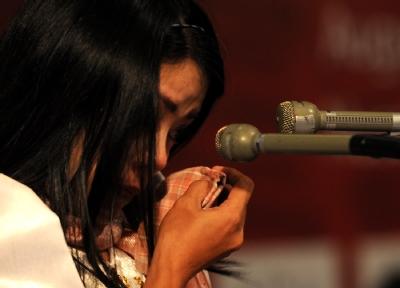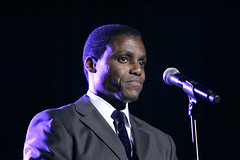Abbey, not her real name, was presented by the recruitment agent with a three-year contract, which included transport to the Lebanese hospital, and a salary of US$1,000 per month.
On arrival there, however, she was put in a house with another Madagascan domestic worker where she was forced to cook, clean and care for three children and a newborn.
"We didn't sleep day or night; we had to be up whenever the baby cried. We didn't even have time to shower or eat during the day because we were always rocking him so he didn't cry. It was like that for two and a half years," Abbey told IRIN.
From her salary of just $150 a month, Abbey said she had to give her Lebanese employer money to buy food for her: "So basically, we were working for free."
Cases like Abbey's are not uncommon in Lebanon, which is a country of destination for women trafficked from Africa, Sri Lanka and the Philippines for the purpose of domestic labour.
In June, Lebanon was added to the US State Department's human trafficking tier 2 watch list [http://www.state.gov/g/tip/rls/tiprpt/2009/123132.htm] for its failure to protect victims of trafficking or to prosecute those responsible.
Inclusion on the list, which includes neighbouring Syria on tier 3 (the worst category), [http://www.irinnews.org/Report.aspx?ReportId=82686] for a second year could mean Lebanon faces US sanctions on non-humanitarian and trade-related aid and US opposition to loans and credits from the International Monetary Fund and World Bank.
Deception, exploitation
Being deceived about the job she was brought to Lebanon to perform makes Abbey's case one of trafficking under the established UN definition [http://www.unescap.org/esid/Gad/Issues/Trafficking/index.asp] of the "recruitment, transportation, transfer, harbouring or receipt of persons, by means of the threat or use of force".
However, the US State Department's 2009 Trafficking in Persons (TIP) report [http://www.state.gov/g/tip/rls/tiprpt/2009/] makes clear it considers trafficking to include the conditions a worker is kept in, including forced labour and debt bondage. That makes not only Abbey's life after arriving in Lebanon a case of trafficking but means the situation of many of Lebanon's estimated 200,000 migrant domestic workers [http://www.irinnews.org/Report.aspx?ReportId=78865] can also be considered trafficking.
"Women from Sri Lanka, the Philippines, and Ethiopia who travel to Lebanon legally to work as household servants often find themselves in conditions of forced labour through withholding of passports, [http://www.irinnews.org/report.aspx?ReportId=83948] non-payment of wages, restrictions on movement, threats, and physical or sexual assault," said the TIP report.
'
Local rights activists praised the recognition of exploitative labour conditions as trafficking.
"Working on trafficking is very difficult because of the definition set by the UN, but if you simplify it you see that there are three main components: the recruitment; deception or coercion; and then that the purpose of recruitment is exploitative. This is considered trafficking," said Ghada Jabbour, gender and trafficking specialist at Lebanese NGO KAFA.
The TIP report said that exploitation includes the specific crimes of "involuntary servitude, peonage, debt bondage, or slavery".
After escaping from the home she was forced to work in, Abbey has spent the past 10 years working as a freelance domestic worker, facing jail if she is caught by police without the identification papers she was never issued with, and owing $5,000 in fines to the General Security Directorate, a Lebanese intelligence agency, for overstaying her visa.
Little protection
Domestic workers remain outside Lebanon's Labour Law and its protection.
Last year, according to the 2009 TIP report, the Lebanese government reported no criminal prosecutions, convictions, or punishments for trafficking offences, a significant decrease from the 17 prosecutions reported in 2007.
The Lebanese Penal Code does not specifically prohibit forced labour or trafficking, but Article 569's prohibition against the deprivation of an individual's liberty to perform a task could be used to prosecute forced labour. Commercial sexual exploitation, deprivation of freedom and use of false documents are also criminalized in Lebanese law.
The TIP report urges authorities to investigate and prosecute claims by domestic workers who have escaped abusive employers, and implement the new unified contract for domestic workers [http://www.irinnews.org/report.aspx?ReportId=83948] created in March this year, but which rights groups say remains largely unimplemented.
Valuable trade
Activists believe the value of the trade in domestic workers is such that the political will to comply with international regulations against trafficking remains lacking.
"The money that is collected through domestic workers coming to Lebanon is millions of dollars per year. You have the residency fees, the visa and recruitment fees on both sides for the worker and the employer," said KAFA's Jabbour.
"The government takes a lot of money in the process by regulating domestic workers and there are a lot of stakeholders. Politicians are also involved in this issue and it goes underground, which is why it's difficult to get laws to protect these women."
http://www.tayyar.org/Tayyar/News/PoliticalNews/en-US/128988024720725404.htm#

![Reblog this post [with Zemanta]](http://img.zemanta.com/reblog_e.png?x-id=860e153f-f6da-48a0-9964-6a0fac28d031)
![Reblog this post [with Zemanta]](http://img.zemanta.com/reblog_e.png?x-id=741743b4-0ce7-484c-ae39-5396c9d55495)




![Reblog this post [with Zemanta]](http://img.zemanta.com/reblog_e.png?x-id=34186fe0-0582-4c9c-80c6-bb33f20cd33a)
![Reblog this post [with Zemanta]](http://img.zemanta.com/reblog_e.png?x-id=4b1080d3-a82a-48c4-b2ce-73e2ed58af89)

![Reblog this post [with Zemanta]](http://img.zemanta.com/reblog_e.png?x-id=25d0513d-635e-4f41-9655-ad8b10db69c4)
![Reblog this post [with Zemanta]](http://img.zemanta.com/reblog_e.png?x-id=e06c74ed-9de2-4602-8eb3-0ae120ab0867)

![Reblog this post [with Zemanta]](http://img.zemanta.com/reblog_e.png?x-id=6a072557-7ed5-4fa1-835f-7e9c7ef67106)
![Reblog this post [with Zemanta]](http://img.zemanta.com/reblog_e.png?x-id=c0c2ca6a-13d6-4ff4-954c-5fec19319676)

![Reblog this post [with Zemanta]](http://img.zemanta.com/reblog_e.png?x-id=21270afb-e072-4702-8ba4-f63c342726c4)
